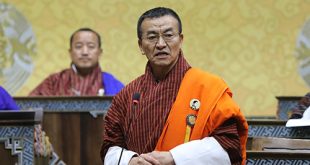 But inventors will need to wait two years for a patent to be registered
But inventors will need to wait two years for a patent to be registered
The intellectual property division (IPD) of the ministry of economic affairs (MoEA) has finally established a registry for patents as mandated by the Industrial Property Act of the kingdom of Bhutan, 2001. This means inventors are provided with an effective means to protect and promote their inventions.
In simple terms, a patent is an exclusive right granted for an invention, which is a product or a process that provides a new way of doing something, or offers a new technical solution to a problem. It is an official license from the government giving one person or business the right to make and sell a particular product or process and to prevent others from doing the same.
The registration has been opened to all interested individuals and companies from March 1, 2012. An applicant must file a patent application with the Intellectual Property Division, MoEA which will assess whether it meets the requirements of the Industrial Property Act of 2001 and the regulations pertaining to it. A patent protection gives the owner of the patent the exclusive right to stop others from manufacturing, using and or selling the owner’s invention in Bhutan without the owner’s consent or permission.
The cost of filing a patent application is Nu 3,000.
The IPD office has received two applications for the first ever patent registration. An intellectual property (IP) officer with the IPD, Kencho Palden said, “We have received two applications, one from the country and the other from a foreign inventor.”
Earlier, certain newspapers had written about issuing the first patent to a joint venture between the National Biodiversity Centre (NBC) and Quantum Pharmaceuticals Limited (QPL), a Swiss company which conducted research studies on an orchid (cymbidium erythraeum) commonly known as ola tshe. It was found that ola tshe could be an ingredient for some cosmetic products.
However, Kencho Palden said information regarding the applicants is kept confidential to protect the interest of the inventors. “We have not received any report of studies or research from them(NBC and QPL)”, he said.
Kencho Palden explained that “patent is territorial right. A patent granted in India doesn’t mean it will be protected in Bhutan.” For instance, Bhutan refrains from providing patents for natural plants while it may be not true in other countries.
However, bottlenecks cannot be avoided. Like many developing countries, the IPD office lacks technical capacity to provide patents to inventors. IPD office shall accept applications and forward it to the World Intellectual Property Organization (WIPO) for examination. WIPO accepts such requests only if they are made by institutions or individuals from developing countries and the service is free of charge. The requests made by private institutions or individuals require the endorsement of a government authority and any information given by the requestor to describe his inquiry will be treated as confidential.
The approximate time taken by IPD in examination of a patent is two years as it needs to undergo different phases. Upon receipt of the request by WIPO, it will be examined by another institute and rigorous examination will follow till registration or disqualification of the patent.
One of the principal mandates of WIPO is to offer technical assistance to developing countries. This also includes the access to and use of technological information contained in patent documents in order to accelerate the economic, social and cultural development in developing countries. In line with this part of its mandate, WIPO has assisted a number of developing countries and countries in transition in establishing their national industrial property information system by providing, for example, expert assistance, training, and collections of patent documents.
A patent is protected 20 years from the date of filing subject to use.
Of all of the forms of intellectual-property protection, patents are the most complex and tightly regulated. Patents are basically copyrights for inventions. Unlike copyrights, patents protect the idea or design of the invention, rather than the tangible form of the invention itself. Consequently, patenting something is a much trickier procedure than copyrighting something.
Statistics show that there are currently more than 10,000 trademarks registered with the IPD. Three designs have been registered out of which two are under examining process. Two patent applications have been received and are under examination.
Bhutan is in the process of drafting the National Intellectual Property policy. A two-page concept paper has also been developed by consultants from WIPO. Kencho Palden said there will be intensive consultations before any of the provisions come into effect.
 The Bhutanese Leading the way.
The Bhutanese Leading the way.




Dear Sir/Madam
i have one inquiry in regard to the filing the application for the Intellectual Property Division. Do we need a trade license for the manufacturing product prior for filing the application/registration in your department. It is mandatory to show the trade license or not while we filing the application/registration.